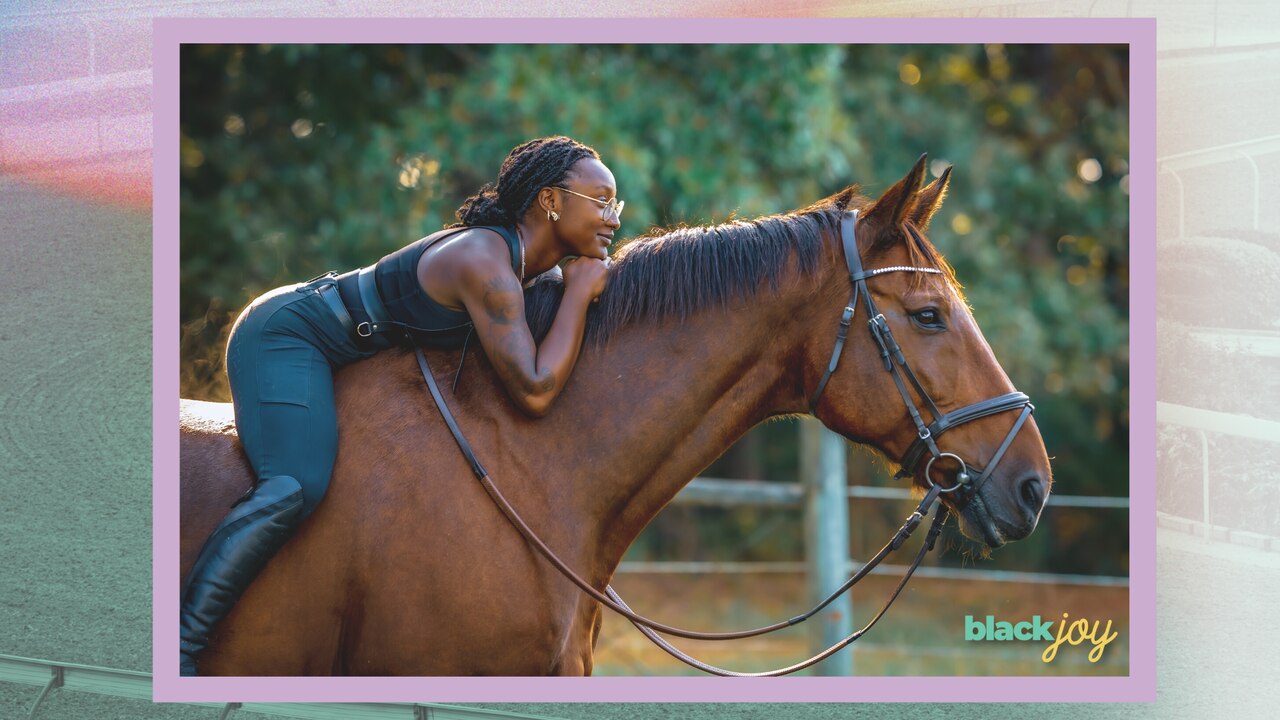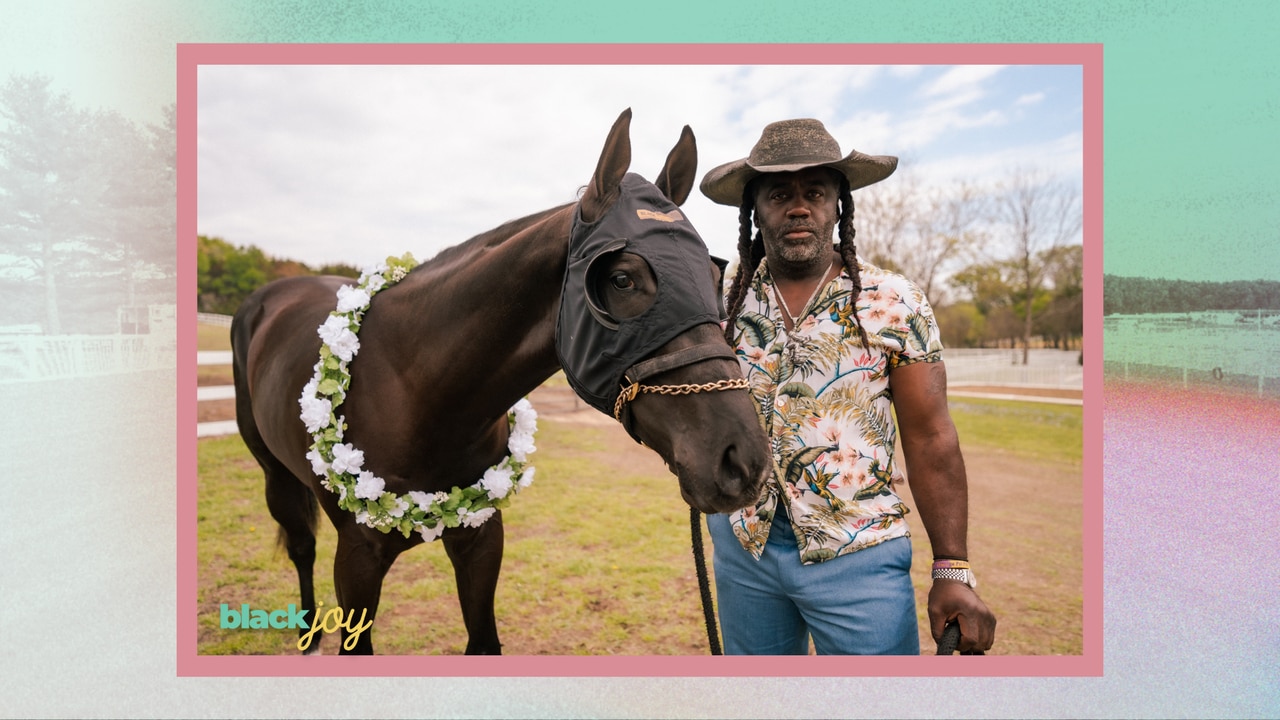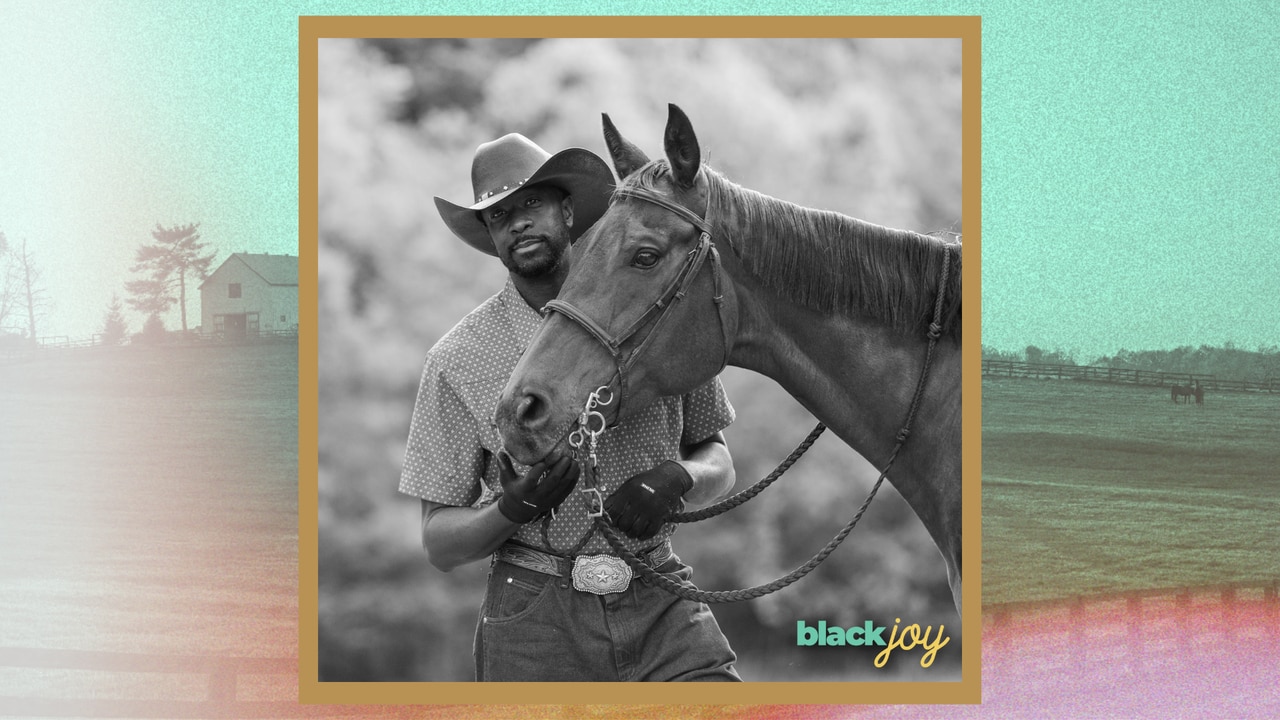Getting Black AF for the Kentucky Derby | Black Joy – May 5 2023
All the mommas of Black Joy put your hands in the air and say, “AYY!”
Mother’s Day is next Sunday y’all. We’re showing love to people who bring so much love and nurturing into our lives. So send us your photos and kind messages through this Google form so we can brag about your momma on Instagram. It doesn’t matter if you choose to celebrate your grandmother or a nonrelative who became a mother figure in your life. We understand motherhood comes in many forms, and we are here for all of it!
You still got some time to get mom a nice gift of joy.
So for now, it’s time to saddle up and take a horse ride through history as we honor Black culture in the equestrian world. Don’t forget to send this newsletter to your friends and fam cause you definitely don’t wanna miss out on the knowledge we got for y’all today.
– Starr
That time when the derby was Black AF
What comes to your mind when you hear the words “Kentucky Derby”?
Some of you may think about the sophisticated fashion trends. Others may ponder about the prestige presented during the nation’s oldest continuously running sporting event.
Black Joy is switching up the conversation by uplifting the Black jockeys who started the most popular horse race in the world. Reckon sis Khavolshaia Howze chatted with Alicia Hughes, who is the only Black woman reporter in the nation covering thoroughbred racing. Alicia schooled us on the Black history of the Kentucky Derby.
Mercury got her tight microbraids in again. So here’s the YouTube link just in case the video below freezes up on ya’.
If you are tired of the erasure of Black cowboys and cowgirls, we feel you. That’s why we hit up three Black equine-lovin’ folks who are preserving the culture. You can read snippets of their stories below or you can read the extended version of our newsletter featuring their full stories.
Ain’t horsin’ around with our healing
Daryl Fletcher poses with his horse as the founder of SOOFA Ranch near Atlanta.
Daryl Fletcher is a man of many mantras. One of them is within the name of Daryl’s nonprofit SOOFA Ranch. The acronym stands for Step Out on Faith Again. After living that entrepreneur life for the majority of his adulthood, Daryl said he learned a thing or two about hope.
“You have to believe in what you want to do and put forth the action that supports that belief,” Daryl said. “So many times when things are not going the way you want them to, you have to step out on faith and try again. We have had to do that with our ranch several times because the task that we’re trying to do and accomplish is not an easy feat.”
May is Mental Health Awareness Month, and Daryl’s 71-acre oasis is just a 30ish-minute drive from bustling downtown Atlanta. But SOOFA Ranch does more than just guide you on a peaceful stroll on horseback. Book a trail ride and your coins will help those in need get access to equine-assisted therapy. Daryl partners with multiple mental health professionals to create a healing experience as guests care for and/or ride the horses.
About 85 percent of the ranch’s clientele are people of color, and the majority of those folks have never ridden a horse before. Which is why the SOOFA Ranch fam doesn’t just stay in the woods. They hit the streets through their “Horses Healing the Hood” program with a mission to improve the wellbeing and personal development of underserved youth.
Part equine assistant and part certified counselor, Daryl said has an interesting perspective while providing these services. He’s reining in two taboos at once: one about mental health and another concerning the behavior of horses. He said many people are afraid that a horse will bite or kick them, which tells Daryl that clients are basing their relationship with horses from old western movies.
“One of the things we try to do in order to disarm people is that we tell them don’t do anything that you see on TV or on social media because our horses are trained specifically to serve them for their benefit and safety,” Daryl said. “We try to make sure people understand that horses are healing because they’re sentient beings that have feelings. The unique thing about horses is they will begin to match your emotions. If you’re feeling happy, that horse is going to start feeling good. If you feel excited, that horse will start feeling it.”
The goal of his nonprofit is to open ranches in communities of color across the nation to increase access to equine-assisted therapy.
“Communities of color have been systematically underserved. So if we’ve been systematically underserved, we have to begin to intentionally serve them,” Daryl said.
“Many people would like to forget we started out as a property in this country, or even below property in many instances,” Daryl continued. “My grandfather – a man who I saw, touched, walked with and learned from – was born in 1914. His grandfather was a slave. So I’m impacted by slavery not just indirectly, but directly. He impacted the way my mother thinks. My mother impacts the way I think. Therefore, I’m not that far removed from slavery. So we have to be in these different arenas and different communities because we have to unlearn some things that we have learned from previous generations, not just with those who are byproducts of slavery, but those who have been a byproduct of society’s stigmas, society’s way of thinking and society’s way of life. That’s reason why we want to be in these communities.”
During his 20 years working as a youth pastor in both Miami and Maryland, he watched youth flow in and out of the prison pipeline. Daryl built up his confidence and character while spending his summers on his grandparents farm where he dreamed up an idea to help youth by opening a ranch of his own. That dream came true when he moved to Georgia and opened SOOFA Ranch in 2018.
Daryl is familiar with the healing nature of horses. His father plopped him on a horse when he was seven. He said that adventure with his dad liberated him from the fearful way he used to see the world back then.
“The fear was removed, and the liberation was replaced. It was just one of those things where I was like, wow, this is great,” Daryl said. “To people who struggle with fear, everything is a threat. It’s hard for them to enjoy certain things because they think things are out to get them. So understanding how to break that down with horses, I just kept pushing at it. Kept going, and that’s where I found my sweet spot.”
Although his father died that same year, he still feels his father’s presence. Daryl said horseback riding has healed his mental health by giving him a way to decompress. And Seeking peace is a necessary ritual as a Black man, he believes.
“We’re under pressure in so many different instances,” He said. ” Sometimes we are pressured at home. Sometimes we are under pressure in the streets. We are constantly under pressure by society. So you need that moment to exhale. You need that moment to say, ‘You know, I’m OK.’ It’s typically challenging to do that because you can be labeled as soft. You can be labeled as, ‘Oh, Black men don’t cry. Men don’t cry.’ Or whatever the case may be. So all these labels that can be put upon you, it can be sometimes overwhelming.” Daryl said.
Tameka takes the reins of her Blackest joy

Tameka Claiborne poses with a big bay gelding named Devine. The 23-year-old assistant horse trainer is working with another equestrian of color to diversify the industry in Aiken, S.C.
Tameka Claiborne grew up with the absence of Black cowgirls – and it showed.
A woman who grew up talking to the trees, wind and animals as if they were kin, she took up the sport of eventing during her junior year of college. Tameka described eventing as a triathlon for horses. Sis also describes it as a sport filled with mostly white people. While performing in front of the white gaze, her Blackness became a stranger. Code switching became her best friend. she tinkered with how she talked and the music she vibed to.
Yeah…..sis don’t do that no mo’.
“The most important thing is reminding myself that I belong and need to take up space,” Tameka said. “It got to the point where I fully realized, ‘No. I absolutely belong anywhere I take myself.’ You will see me, and you will see me as I am. You are not going to be colorblind about the situation. You are not going to diminish my skills, my talent, my persona.”
A 23-year-old assistant horse trainer in Aiken, S.C., Tameka is changing the racial landscape of the industry on the Gram and alongside her Puerto Rican and indigenous homegirl Michele Arana. On May 20th, they’ll be hosting the grand opening of In-Stride Equestrian, which is on a mission to encourage and uplift equestrians of color, Tameka said.
“It’s a barn with a Black woman and a Puerto Rican woman, and we’re blasting Bad Bunny. We’re blasting Lil Nas X. We’re blasting like all of our stuff and just being authentically ourselves.” Tameka said. “I’ve always had a saying like, ‘Happy riding and you belong.’ Don’t ever let anybody tell you what it is you can and can’t do. One of my secrets in my opinion is the Black joy in standing in that truth. You deserve all the happiness, contentment, peace and healing you possibly can in life.”
Tameka’s main goal is to open her own eventing academy, where she can finance the passion of Black and brown horse lovers who just want to enjoy the sport of horseback riding. But money, elitism and lack of representation are common barriers for people of color getting into the arena. Even when Tameka Googles “Black equestrians,” she gets pictures of Black horses.
“I don’t understand why this is such a foreign concept because equestrians of color have been around since equestrianism has been a thing,” Tameka said. “Why aren’t we seeing that? Why is that not being represented? There are thriving communities of color. Why are we not highlighting them, and why are we choosing to ignore them when we are creating products or when we are crafting campaigns? Why are we only focusing on one sector of constituents when it comes to our equestrian companies and brands? I think those kinds of concepts and things need to be addressed.”
Until then, Tameka is being the change. She’s talking to her local Boys and Girls Club to see if the youth could ride down to their barn to simply interact with the horses, because then they will see that a career with horses is possible.
“A big big dream of mine is literally – I call it being surrounded by sea brown,” she said. “I want to go to a barn, and all I see is different shades of brown everywhere. Everybody is a person of color. Everybody is laughing and enjoying themselves, and is skilled in caring about their horses.”
Hartley brothers continuing the legacy of history

Ke’elronn Hatley poses with his racing horse Black Wall Street.
Bringing back another oldie but a goodie with this one! Last June, I wrote about Hatley Brothers Racing Stables, which is run by the first Black family to run quarter horses in Texas. James Hatley Sr. kicked off the legacy by purchasing the family’s first racehorse in 1961.
The closure of two major racetracks in the area forced the family to stop racing and start rodeoing during the 90s. But James’ sons Ke’elronn Hatley and James Hatley Jr. picked up the reins in 2020 with their racehorse Black Lives Matter. The brothers became popular on social media and on the race track, especially after Black Lives Matter won a race at Louisiana Downs Casino and Racetrack in January 2022. The horse had his own fan club, y’all. Seeing that many Black people wearing Black Lives Matter shirts made Ke’elronn’s heart swell with pride. He said he wants folks to know the truth about Black horse racing.
“We were the originals. The first Kentucky Derby was worn by Black jockeys and Black trainers, but they don’t even mention it,” Ke’elronn said. “They just act like it’s non-existent. So kids need to know that this mess they teach in history now is just pure baloney. They don’t tell the truth.”
Unfortunately, Ke’elronn said Black Lives Matter was killed during a common medical procedure at a veterinarian’s office. The family filed a lawsuit against the white vet last fall. Ke’elronn suspects that the lawsuit is going to take longer than they’d hoped because they haven’t been to trial yet.
“They basically murdered our horse all because of his name and what he represented, and what he stood for,” Ke’elronn said. “That’s why we started all of this. We can’t bring him back, and some things are just irreplaceable.”
The family was devastated, but the Black joy must go on. The brothers wasted no time finding another horse for the culture. Last year, they named their new steed Black Wall Street, which honors the Black businesses and homes they were demolished by a white mob in Tulsa, Okla. The family is still working out some kinks with Black Wall Street, but Ke’elronn laughed when he mentioned his next race, which is going to take place in Oklahoma next week.
“We wanted to keep the name of Black going on and going strong,” he said. “When you go into these sales and these arenas and things, everything is predominantly white people. On the walls inside the building white people are hung up everywhere and the Black and Mexican people are working in the back area. Just walking through these places I’m like, ‘Is this really how it is? When will this ever stop? so I was just like, ‘Well, why don’t we call him Black Wall Street.’ Because we want black businesses to be able to thrive from his name.”
Just like Black Lives Matter, Black Wall Street has his own fan page, where people can soon buy merch before his next race. To Ke’elronn, the solution to diversifying the racing industry is simple.
“Get Black people involved. Get Black veterinarians. Get Black trainers. Get Black attorneys. Get more Black people in offices making these decisions and writing these rules and all that. You know those are very powerful moves that need to be done.”
Now gallop into the sunshine and spread the Black joy! See ya’ next time!
